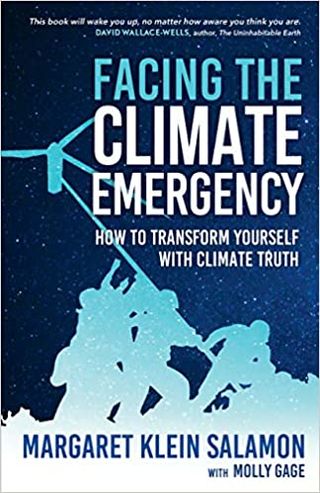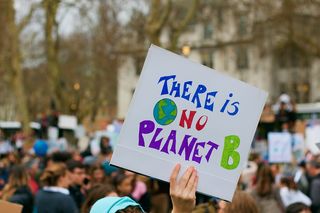Self-Help
The Emotional Toll of the Climate Emergency
An interview with psychologist and climate warrior Margaret Klein Salamon.
Posted August 6, 2020
Sage guidance for those who are overwhelmed by the current and growing climate emergency.
"Facing the Climate Emergency gives people the tools to confront the climate emergency, face their negative emotions, and channel them into protecting humanity and the natural world."
I recently became aware of an outstanding book by Dr. Margaret Klein Salamon written with Molly Gage called Facing the Climate Emergency: How to Transform Yourself with Climate Truth. Dr. Salamon is a clinical psychologist turned climate warrior and the Executive Director of the Climate Mobilization Project, focusing on helping leaders enter emergency mode using a psychological approach to build the Climate Emergency Movement. Her work seeks to help people face the deeply frightening, painful truths of the climate emergency and transform their despair into effective action.
I'm pleased Dr. Salamon could take the time to answer a few questions about her most timely and important book that has been endorsed by numerous scholars and climate activists. Here's what she had to say.
Why did you write Facing the Climate Emergency?
I wrote it for a few reasons: We think of climate as a “science issue,” but the climate emergency is a profoundly personal, emotional, even spiritual emergency. People can become paralyzed by their overwhelming climate emotions, and when I host climate conversations, participants express tremendous relief and power in finally breaking the silence and talking about the climate and ecological emergencies from a personal perspective. Finally, I want to do everything I can to protect humanity and the living world.

How does your book relate to your background and general areas of interest?
As a clinical psychologist who founded and directs a grassroots advocacy organization, I have a unique perspective to help readers understand both personal change and systems change. A lot of the emotional advice I give people came out of my clinical training and work. It is not that different helping a patient come to terms with the painful reality of their trauma, and helping people come to terms with the reality of the climate emergency.
I also have a particular interest in self-help books! As a senior at Harvard, studying anthropology, my senior thesis was an ethnography of how college students use dating self-help books.
Facing the Climate Emergency also has an element of memoir woven throughout. By sharing my emotional journey, from denial into pain and finally, into action, I talk about how the climate emergency made me rethink my life story. It’s a very personal book.
Who is your intended audience?
The climate emergency threatens us all, and it is affecting all of us psychologically, so I would like to think it’s for everyone! Realistically, the people who are reading it are people who have already reckoned with the truth of the climate emergency and are struggling with its emotional implications. They feel overwhelmed with grief and terror, and often have no one with whom to share their feelings. They feel alienated and wonder, "Is something wrong with me that I feel this and apparently no one else does?" One reader described Facing the Climate Emergency as “Like seeing a really good therapist.” So perhaps the audience is people who need a really good climate-aware therapist!
What are some of the topics you weave into your book and what are some of your major messages?
There are three key messages of "steps" to facing the climate emergency:
Firstly, we each need to face climate truth. The efforts of the fossil fuel industry, as well as "gradualist" organizations and politicians, have obscured the reality of our climate emergency. We are careening towards the collapse of civilization, the deaths of billions of people and millions of species. This is such painful information. But we have a choice—engage in denial and willful ignorance to protect our minds from the pain of this reality, or face it and get busy protecting ourselves from the actual emergency.

Secondly, I encourage readers to welcome fear, grief, and other painful feelings. Psychologists know feelings should be non-judgmentally explored and put into words. We suffer when we attempt to judge and deny our feelings, in attempts to “stay positive,” for example. We must realize that the terror we feel about the climate emergency is a signal—it’s telling us something critically important. We ignore it at our own peril.
One important part of this step is the guidance to grieve the future you thought you had. Many of us have been told that the future is bright—technological and social progress will march forward as we work towards a bright future for ourselves. The bad news is: it's not going to happen. The climate emergency will undo the stable climate and society we rely on.
Finally, we must reimagine our life stories. Grieving the future you thought you had opens space for something new. I encourage readers to rethink everything in light of the climate emergency. Who are you? What is your purpose? What if you were born to help protect humanity and the living world? I encourage readers to think of themselves as potential heroes, and to take responsibility for protecting humanity and the living world.
How does your book differ from others that are concerned with some of the same general topics?
I combine the psychological and the political/social movement dimensions. I don’t just talk about feelings—I talk about concrete actions and steps you can take!
Are you hopeful things will change for the better as people learn about how to deal with the climate emergency?
Yes! As millions of people around the world accept climate truth and enter emergency mode, the Climate Emergency Movement will build tremendous power. The coronavirus has demonstrated to the public that the government can and must drastically intervene in the economy in order to protect life. I think that is a really big deal.
What are some of your current projects?
I am working to bring the lessons of Facing the Climate Emergency to as many people as possible, with a focus on leaders and high-impact individuals. With a small team, within the organization that I founded and direct, Climate Mobilization Project, we are offering workshops, catalyzing conversations, and creating digital tools for getting people talking about the emotional side of the climate emergency.
Is there anything else you'd like to tell readers?
Don’t take my word for it. Visit FacingTheClimateEmergency.com to receive a free preview of my book. And, if you’d like to dive into a more academic discussion of climate truth and emergency mode, see my paper "Leading the Public into Emergency Mode."




